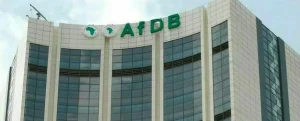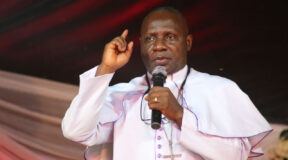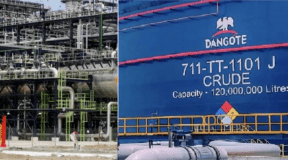Nationwide Protests
OpenLife Nigeria reports that at a time Nigerians trooped out on Thursday, August 1, 2024 to vent their anger over the outrageous cost of living in the country, African Development Bank, AfDB has expressed worries over the state of Nigeria’s economy.
AfDB are particularly worried that for the administration of President Bola Tinubu to achieve its lofty ideas about improving the nation’s economy and lifting people out of poverty, the disturbing rise in food prices and general prices of goods and services must be tackled headlong and fastly too.
According to the ‘Nigeria country focus report’ which was launched by the African Development Bank on Thursday, the continuous increase in general prices and has been identified as a setback that could prevent the growth projection of 3.2 percent and 3.4 percent for 2024/2025.
Specifically, the report noted that with over 63 percent of Nigerians still multidimensionally poor, 18 out of 36 states recording poverty levels that are above the national average, there is cause for worries.
In its reasoning, high poverty reflects the effects of economic shocks as well as policy and structural challenges in the economy that undermine the private investment to create quality jobs.
According to BusinessDay newspaper, Jacob Oduor, the lead economist , Nigeria Country Department, AfDB, who presented the report, noted that inflation is still an issue in Nigeria, as it remains higher than the West African average and African average.
He stated that the country’s fiscal position is expected to narrow further, supported by the increased revenue coming from the maturing reforms that are taking place on the revenue side.
Oduor noted specific risks to look out for, including insecurity, which he said was affecting food production, agricultural production, as well as oil production.
His words:
“So looking forward into 2024, 2025, growth is expected to improve in 2024 to 3.2 and 3.4 in 2025. But this growth, even though is better, is still lower than the West Africa average and the African average.
“So what we see currently with the escalation of persistent inflation and escalation of food prices, which are expected to dampen consumption, are probably going to be issues that may dampen this growth further.
“We also expect to see further pressure on the exchange rates, which have implications again on imported inflation with a high import bill being transmitted into the consumption basket of the general population.
“So generally, policy measures to foster high and resilient growth in the short term, currently the tight monetary policy in place should be maintained, but just cautiously not to increase the monetary policy rate too fast and too further, because that has implications on credit and that feeds back into production costs.
“And then secondly, as the reforms take shape, there’s need also for social protection, influencing those who are vulnerable and those who are adversely affected. But here also targeting of beneficiaries is important, so as to ensure social benefits only go to those who merit it.”
According to him, the country, in the medium term, is expected to continue with it’s ongoing tax administration reforms in order to increase those on the tax bracket.
The economist further highlighted improving security as a critical strategy for food production in the medium term as well as increased crude oil production to boost foreign exchange earnings.
In the long term, Oduor stressed on the need for infrastructure development, particularly in energy supply. These infrastructure he said would include developing refinery capacity to help not just maintain fuel prices at the pump, but also to deal with the implicit subsidy that the government currently shoulders.
“So when you have pump prices contained, then the expenditure of the government on the implicit subsidy, which is a concern for the fiscal space is going to be maintained,” he said.
He also observed that the pace of structural transformation has not been sufficient for industrial takeoff. This he said has led to the relocation of labor from agriculture to other sectors particularly services.
According to the report, more than half of Nigeria’s workforce (56 percent) are employed in three sectors that are less productive than the economy-wide productivity (agriculture, transport, and public service).
Manufacturing and wholesale and retail trade, both of which are only 20 percent more productive than the economy-wide productivity, the total workforce employed in the five sectors is 80 percent.
Nigeria needs $47.6 billion annually until 2030 to accelerate transformation
It states that there may be scope for aggregate productivity gains by reallocating labor to the high productivity sectors, even though not all the high-productivity sectors are labor intensive. “Modest movements out of the lowest-productivity sectors may generate some growth.
“The low relative productivity of the manufacturing sector, which constraints the pace of industrial development and the pace of structural transformation is of much concern.
“The manufacturing sector in Nigeria, like in many parts of Africa is characterized by a growing number of small and informal firms that experience employment growth but little or negative productivity growth.
The service sector is the most productive in Nigeria, all the service sub-sectors except the public service, are more productive relative to the economy wide productivity. The real estate is 74 times more productive relative to the economy-wide productivity level,” parts of the report read.
AfDB in the report estimates that Nigeria will need $47.6 billion annually until 2030 to accelerate its structural transformation process adding that the bulk of these needed resources are in supporting SDG9 on industry, innovation and infrastructure (USD 19.6 billion in 2030 and US$ 3.4 billion in 2063).
It states that given Nigeria’s current performance levels on these critical sectors and their projected values – assumed to change in line with GDP per capita, the annual financing gap to fast-track Nigeria’s structural transformation is estimated at US$31.5 billion under the SDG framework in 2030 and US$5.5 billion, assuming the Agenda 2063 deadline.
In his remarks, Lamin Barrow, Director General, Nigeria Country Department, AfDB, noted that at 2.9 percent in 2023, GDP growth in Nigeria has decelerated compared to 3.3% achieved in 2022, which according to him is largely attributed to high inflation, continued low oil production and a weakening global economy.
He said that as reforms being put in place begin to bear fruit, the growth rate is projected to recover slightly to 3.2% in 2024 and 3.4% in 2025 .
He stressed on the need for Nigerian government to prioritize measures to accelerate structural transformation including developing infrastructure and accelerated domestic revenue mobilization in the context of the ongoing fiscal consultation program as well as proper valuation of the Nigeria’s critical and rare earth minerals.
“The report estimates that Nigeria needs significant financing to accelerate its structural transformation. The annual financing gap to fast-track this structural transformation is estimated at $31.5 billion to achieve the SDGs and $5.5 billion to achieve the Agenda 2063 targets.
“Closing this financing gap will require innovative policy responses including accelerated domestic revenue mobilization in the context of the ongoing fiscal consultation program as well as proper valuation of the Nigeria’s critical and rare earth minerals.
“These, if well-valued, managed and managed, will have the potential to generate additional resources and for that matter substantial additional resources to underpin structural transformation.”
For Barrow, limited access to affordable financing is a major constraint to fast-track Nigeria’s structural transformation.

This is as he notes that the country faces rising financing costs in the global financial markets with its 30-year bond trading at double-digit yields of 10.9% as recently as June 2024 compared to 8.3% in 2021.
Underinvestment, poor access to capital bedeviling Nigeria —Bagudu
In his remarks, Atiku Bagudu, the minister of Budget and Economic Planning said that the report captures the challenges of macroeconomic reform which necessitates support from other countries, to ensure that they pay off quickly.
The minister stated that the major challenge bedevilling the country was under investments in critical areas of the economy. He added that poor access to capital has led to under investments over the years.
He said, “The major reason for this underinvestment is access to capital, equitable access to capital.
“Countries like Nigeria, but including most African countries, needless to say, have had limited access to capital compared to countries, even in other countries in the south, but compared to the countries in the northern hemisphere, our access to capital in terms of pricing, in terms of adequacy, has been tepid.
“And we, because of access to capital, even those sectors that can do much better have not been able to achieve their potential.
“The best example is agriculture, our agricultural sector, whether it’s farming, whether it’s the livestock sector, especially the livestock sector, we have not invested in them fast enough to modernize, and it has been, rather than being a source of economic growth, has been a source of conflict generation.”







